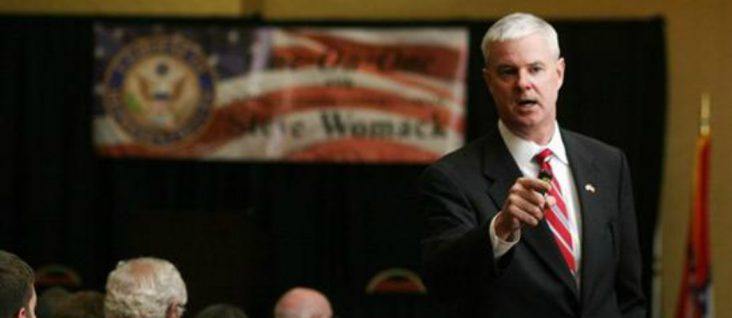Womack: Aside from Ryan, leaders didn’t support two-year budget effort
by December 3, 2018 8:48 pm 850 views

U.S. Rep. Steve Womack, R-Rogers, said the effort to create a two-year congressional budgeting process failed because it didn’t have the support of congressional leadership, because the threshold for passage was too high, and because members of Congress are too concerned about winning and not content simply to move the ball down the field.
Womack made the comments in an interview four days after the Joint Select Committee on Budget and Appropriations Process Reform, which he co-chaired, failed to advance a package of reforms.
Among them was replacing the current annual budgets with a biennial process, which the state of Arkansas uses in its budgeting.
The package failed Nov. 29 after four of the eight Democrats on the committee voted present, two voted no, and only two voted yes. Among those voting present was Rep. Nita Lowey, D-New York, the committee’s co-chair.
The package required five yes votes from each of the two parties, both of which had eight members. Womack said that was a high threshold to clear. It passed 5-3 among Republicans.
Womack said committee members seemed to agree about a lot of the issues during meetings. He believed passage was possible, which was why he was willing to postpone the vote originally scheduled for Nov. 27. But when the votes were cast Nov. 29, it soon was obvious it would fail.
He said Speaker of the House Paul Ryan, R-Wisconsin, a former House Budget Committee chairman, was the only one of the four top congressional leaders who supported the process. Womack believes Sen. Chuck Schumer, D-New York, the Senate minority leader, and Rep. Nancy Pelosi, D-California, the House minority leader, opposed the package. He said Senate Majority Leader Mitch McConnell, R-Kentucky, could have advanced it to the floor and protected it if he wanted it to pass.
“I think Paul Ryan was generally interested in seeing this move, but I don’t know that that same energy or that same enthusiasm was shared by Leader McConnell and certainly not by the two on the Democrat side,” he said.
The committee was formed as a result of the Bipartisan Budget Act of 2018. It was composed of four Republicans and four Democrats from the House and four of each party from the Senate. Ryan selected Womack to co-chair the committee.
The Arkansas Democrat-Gazette quoted Lowey saying that “the lack of an agreement between Senate leadership on a fair and bipartisan process for floor consideration opens up our final product to partisan mischief that frankly could undo our work and worse, actually make the budget process even more difficult.”
Moving to a biennial budgeting process would not have fixed the federal government’s finances, but it would have been a first step and would have demonstrated that Republicans and Democrats could work together, Womack said. He said the Republicans who voted no believed it didn’t do enough.
“It’s kind of like, well, it was first down, and we got five yards, but because we didn’t score, we’re just going to repeat the down,” he said.
Womack said a biennial budgeting process is necessary because of the divisions in Congress and because of the limited amount of time members spend in Washington – about 120 days a year. Creating a two-year process would set a top-line amount and give members of the House and Senate Appropriations Committees more time to pass first one year’s appropriations, and then the second. Doing so would help Congress avoid stopgap continuing resolutions and huge omnibus packages.
Womack and Rep. John Yarmuth, D-Kentucky, who voted for the package, introduced a bill on their own that includes the package’s provisions related to the House of Representatives. Along with biennial budgets, their bill’s provisions include requiring Congress to complete action on the budget by May 1 of each odd-numbered year, requiring the executive branch to submit an annual supplemental budget by December 1 of each calendar year, and repealing term limits for House Budget Committee members. House and Senate Budget Committees would hold an annual hearing on the fiscal state of the nation. As of Dec. 3, the national debt was $21.85 trillion.
Womack said filing the bill is “an act of defiance” because passage is extremely unlikely.
Womack is House Budget Committee chairman, while Yarmuth is the ranking minority member. When Democrats take control of the House in January, they will switch roles.
Other issues discussed by members of the committee were ways to hold Congress accountable, such as limiting travel if Congress doesn’t pass a budget, and what Womack called “deweaponizing” debt ceiling votes. Womack said he favors starting the government’s fiscal year on January 1. It currently starts Oct. 1.
Womack said the bill was derailed in part because of a congressional culture focused too much on partisan victories. Whenever an opportunity arises to address the government’s financial imbalance, “There’s always a reason for why we don’t, and usually the reason has something to do with, will it help our majority? Will it help us win back the majority? It’s about winning.”
Womack said the committee could have made a serious contribution to improving the process. But that opportunity was lost.
“We started with a broken and flawed process, and we still have a broken and flawed process, so next year when we run into this continuing resolution stuff, which is probably going to happen, just remember this moment,” he said. “We could have done something about it, and we didn’t.”
